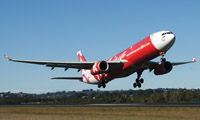News Backgrounder
A budding romance
Until recently, low-cost carriers (LCCs) would have been aghast at the very suggestion of paying commissions to global distribution systems (GDS) operators. Times have changed. LCCs and GDS are finding common, profitable ground.
May 1st 2014
When the Asia-Pacific’s largest LCC operator, the AirAsia Group, recently announced it had signed a deal that will sell all the carrier’s fares and ancillary services via the Travelport global distribution system (GDS, industry watchers agreed the decision was a groundbreaker in the GDS world. Read More »
Traditionally, LCCs don’t talk to GDS, let alone do business with them. LCCs preferred to market their fares via their own websites or call centres, cutting out the GDS middle man.
 |
| 'The Travelport mechandising platform offers us the flexibility to connect to the GDS channel to distribute our low fares to even more travelers as we expand our offering ' |
| Tony Fernandes AirAsia Group chief executive and founder |
Not anymore. Not only is the LCC landscape changing, as it continues to record spectacular growth, but the GDS are re-inventing themselves, with upgraded systems and new products, which have attracted LCCs’ mercantile attention.
In recent years, the blinding growth of Asia-Pacific LCCs has brought its own revolution to the GDS industry. It has jolted them out of their complacency and forced them into encouraging LCCs to tap into every distribution channel available, not just their direct marketing channels, to fill the seats their fast expanding fleets are bringing to the market.
As Damian Hickey, vice president distribution, sales and service for Travelport, put it during the recent annual UATP Airline Distribution conference: “I can assure you that every significant low-cost carrier in this part of the world is in active dialogue with us. Previously, we would not have been in these conversations.
“LCCs are hitting a glass ceiling in terms of distribution. They are asking: ‘how can I distribute to travel agents in a more effective and efficient way?’”
What changed the game for AirAsia is Travelport’s Merchandising Platform, which was launched a year ago. It offers aggregated shopping, but also provides two other critical attributes: ancillary services and Travelport Rich Content and Branding.
The ancillary services component allows travel agents to sell pre-allocated seating, meals and bags, within their existing workflow rather than by booking on an airline website. Travelport Rich Content and Branding enables airlines to market and retail their products more effectively through customization of product display and content.
“The Travelport Merchandising Platform offers us the flexibility to connect to the GDS channel and to distribute our low fares to even more travelers as we expand our offering,” said AirAsia group chief executive, Tony Fernandes. The agreement means Travelport-connected agents worldwide will be able to search and book not only competitive fares, but popular ancillaries such as checked-in bags, advanced seat selection and in-flight meals offered by airlines in the AirAsia group. Travelers can compare and book AirAsia and AirAsia X flights alongside those offered by traditional carriers in exactly the same booking workflow.
| 'You have to sit down with your GDS and say: ‘how can I get more value? The booking fee becomes less relevant if you are driving that sort of revenue improvement' |
| Damian Hickey Vice president distribution sales and services Travelport |
Although a leader in the Asia-Pacific in integrating GDS into its marketing, AirAsia is not the first budget operator to jump on the GDS bandwagon. Europe’s major LCCs, Easyjet and Ryanair, who have been throwing insults at GDS since they began flying, last year opted to use indirect distribution systems to build business. GDS offer easy-to-use, flexible products in the corporate travel market.
Ho Hoong Mau, division head of airline distribution at Asia-Pacific’s home-grown GDS, Abacus International, which is partly owned by Sabre, said its LCC business had grown dramatically in the last few years.
“We are getting a lot more flexible in the way we interact with our customers,” he told delegates at the UATP conference.
“We have seen LCC business growth of 80% to 100% year-on-year. It’s off a low base, but the booking numbers are in the multi-millions on Abacus systems. There are a lot of LCCs coming on board. Part of the reason is they are moving from a pure LCC model to a hybrid model.
“There’s a whole bunch of LCCs all over Asia, and from other regions coming into Asia, who are starting to need wider distribution. We are seeing a trend. Very clearly it is a great opportunity for us.
“As we interact with LCCs we realize their considerations are different. We need to remove some of the bells and whistles of traditional GDS content for them.”
Ho said because of the large number of aircraft orders by LCCs “they need to have multi-channel distribution to tap every single channel out there… that’s a key consideration”.
A recent Abacus survey of more than 50 LCCs revealed that more than 40% of their competitors were another LCC. “That wasn’t the case three years ago. With the levels of competition they are facing, especially in Southeast Asia, they need to maximize their revenue channels,” said the GDS.
 |
| AirAsia group turning to a GDS to build revenue |
Gianni Pisanello, director of airline distribution marketing at Amadeus, told the UATP conference the whole LCC situation has never been a technology issue. “What has changed is airlines are reaching a plateau. They are looking for high yield from the business traveler and also to reach new markets.
“They have fantastic targets in terms of growth and they need to tap into the travel agents community to tap that growth. So really it was when were the LCCs ready to participate,” he said.
It is a given that the days of a pure LCC are over. Budget airlines and groups of budget airlines are branching out, hybridizing and even entering the full-service sector. Indonesia’s Lion Air Group operates an LCC, has a premium carrier, Batik Air, and a joint venture regional airline, Malindo Air. Global leader, Singapore Airlines, which holds significant equity in LCC Tigerair, also owns a regional and long-haul LCC, Scoot. Scoot in turn has recently formed a regional LCC with Thailand’s Nok Air.
Analysts conclude the new partnerships between LCCs and GDS reflect the demand for multi-distribution channels to interconnect and sell various brands. Travelport’s Hickey said his company’s deal with AirAsia is regarded as an important shift in LCC business strategy by many in the industry.
“From a GDS perspective, it also indicates some significant changes within the GDS arena.
For many years, the GDS industry evolved purely because of the complications of distributing travel products.
“We put some very tight restrictions on the way you did business with the indirect channels. When airlines like Ryanair, AirAsia and others are re-entering the GDS arena, it is because the GDS are breaking down those restrictions and making it easier for airlines to do business with them.
“The GDS industry has been criticized, particularly by the LCCs, for being very expensive. It’s a fragile industry so costs are very important, but if there is one thing the LCCs detest more than cost its complexity. We certainly made it very complex for LCCs to distribute their products.
“Hopefully, it’s a sign that as an industry we are being more flexible. We have a long way to go, but it’s a first step.”
Hickey has a serious message for all airlines. “Ask not what your GDS can do for you but what you can do for your GDS,” he said. “At the end of the day we are a valuable channel. More than $57 billion in revenue goes through the GDS channel,” he said.
“My hope is that the airline community will engage with its GDS and work closely with them so you can achieve better value from your indirect channel,” he said.
“I hear from airlines: ‘I can’t sell my Skycouch on the GDS. Well, yes you can. Ask how you can get access to better yield. EasyJet have gone on public record with its accounts and said it has improved yields by 18% after going to the GDS.
“You have to sit down with your GDS and say: How can I do that, how can I get more value? The booking fee becomes less relevant if you are driving that sort of revenue improvement.”